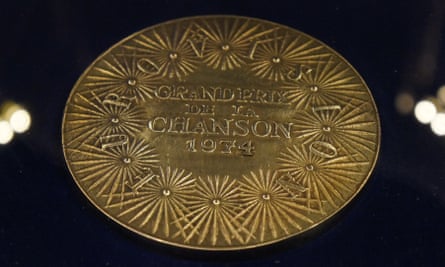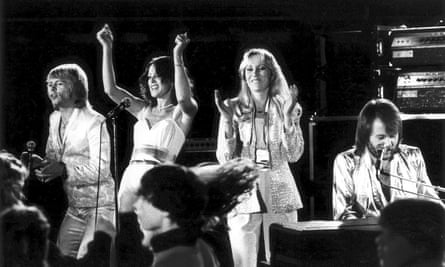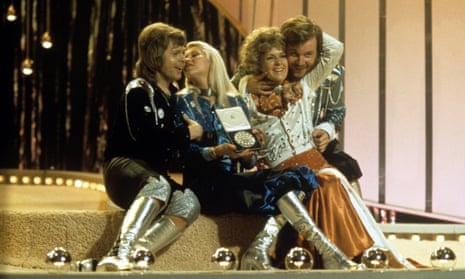It was 1974 and the UK was a grim, pessimistic nation of strikes, mass unemployment, three-day working weeks, power cuts, football hooligans, nylon sheets and Vesta chow mein. But at least there was Abba.
The moment when four unknown, brashly dressed Swedes suddenly became superstars by winning the Eurovision song contest at the Brighton Dome will be celebrated in Super Troupers, an immersive exhibition at London’s Southbank Centre later this year.
Details have been announced of a show that organisers hope will be more than a just tribute to the music of Abba, although there will be plenty of that.
“It will be a different take on Abba we hope,” said producer Paul Denton, who tells the band’s story in a wider political and cultural context. “In 1974 Britain economically was not doing that well … what was it about Abba that actually caught the imagination of the public?
“If you look at pop music across the decade, the huge shifts in musical tastes and the emergence of punk – if you look at the charts, Abba were a mainstay in the album and singles charts and there is something about that which is worth celebrating, and we will show what it was about them which captured hearts and minds.”
Super Troupers will be a finale to the centre’s year-long celebration of Nordic arts and culture and will follow a model set by two immersive and hugely successful exhibitions previously staged there, Adventures in Moominland and The Wondercrump World of Roald Dahl.
Those exhibitions took items from archives and embedded them in a theatrical, narrative setting with small groups guided through the story.

Abba’s Björn Ulvaeus visited Adventures in Moominland and liked the approach. Organisers will borrow items from the Abba museum in Stockholm as well as private archives to chart the rise to fame and legacy of Björn, Agnetha Fältskog, Benny Andersson and Anni-Frid Lyngstad.
Key moments will include the night in April 1974 when Abba, with their song Waterloo, beat the Eurovision favourite Olivia Newton-John, who was representing the UK with Long Live Love.
Visitors will feel like they are in the Brighton Grand hotel suite where Abba celebrated their life-changing victory in the competition. It was the Napoleon suite, the same suite occupied 10 years later by Margaret Thatcher on the night of the IRA bombing.
Items in the room will include the medal won by the band, while on the TV will be their performance, conducted by a man in a Napoleon costume and watched by audience members in dinner jackets and posh frocks. Other settings will include the band’s recording studio and a 1970s disco.
Denton and his team have had access to the Abba museum and its stores and will borrow unseen sketches and drawings for the band’s look as well as personal photographs, album artwork, costumes and instruments.
“We are looking at archive material which has a story,” said Denton. For example, on display will be Frida’s water-stained cape from a 1977 tour of Australia, worn on stage in Sydney as it chucked it down.
The show will also explore the musical context of Abba: who influenced them? Who was the competition?

Denton said there was far more to Abba’s music than is sometimes imagined. “People often think of it as carefree pop but lyrically and musically it is really well crafted. If you, for example, break Dancing Queen down, it is so beautifully done.”
Abba lasted as a band only until 1982 but they have never gone away – perhaps, above all, because the songs were fun and so easy to dance to. “It is weird doing this exhibition,” said Denton. “You know all the words to the songs, somehow they are embedded in our consciousness.”
There was a time when no one in their right mind would admit to being an Abba fan. “Now people with abandon say how much they like Abba and how much they influenced them. People are happy to say ‘yes, I’ve got all the Abba albums.’ There has been a shift in the acceptance of how much influence they have had.”
Abba’s Lyngstad said the group was thrilled to be supporting the exhibition, particularly because it was at the Southbank Centre, “which is just a few short steps away from Waterloo – this connection brings to mind very happy memories of the song that started our great success in Britain.”
She was echoed by Ulvaeus, who said: “Since our songs, which were written in the 70s, are still being played today it’s particularly interesting that the Southbank Centre exhibition is placing them in the temporal context in which they were created. We recorded Mamma Mia in 1975. What happened that year in the UK and in the world? One thing is for certain: it seems unbelievably long ago!”
